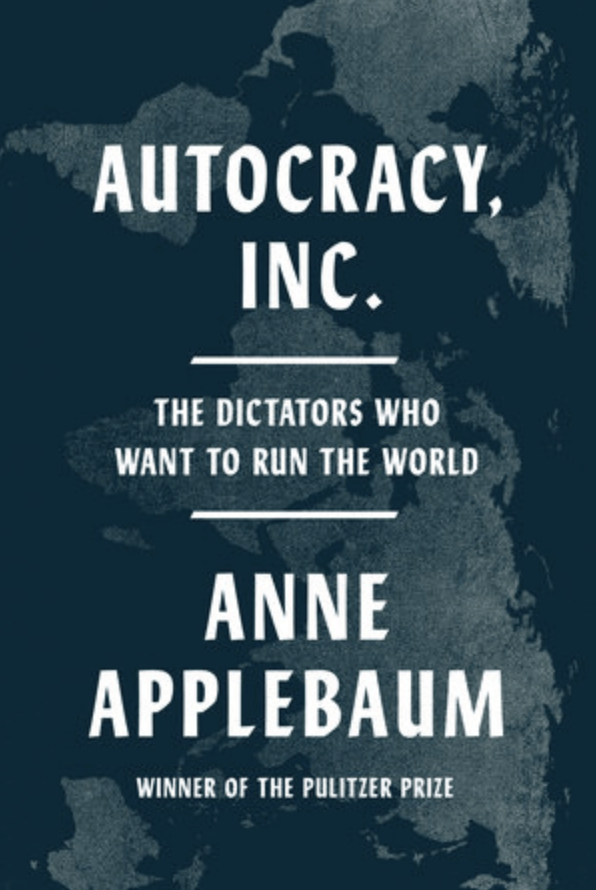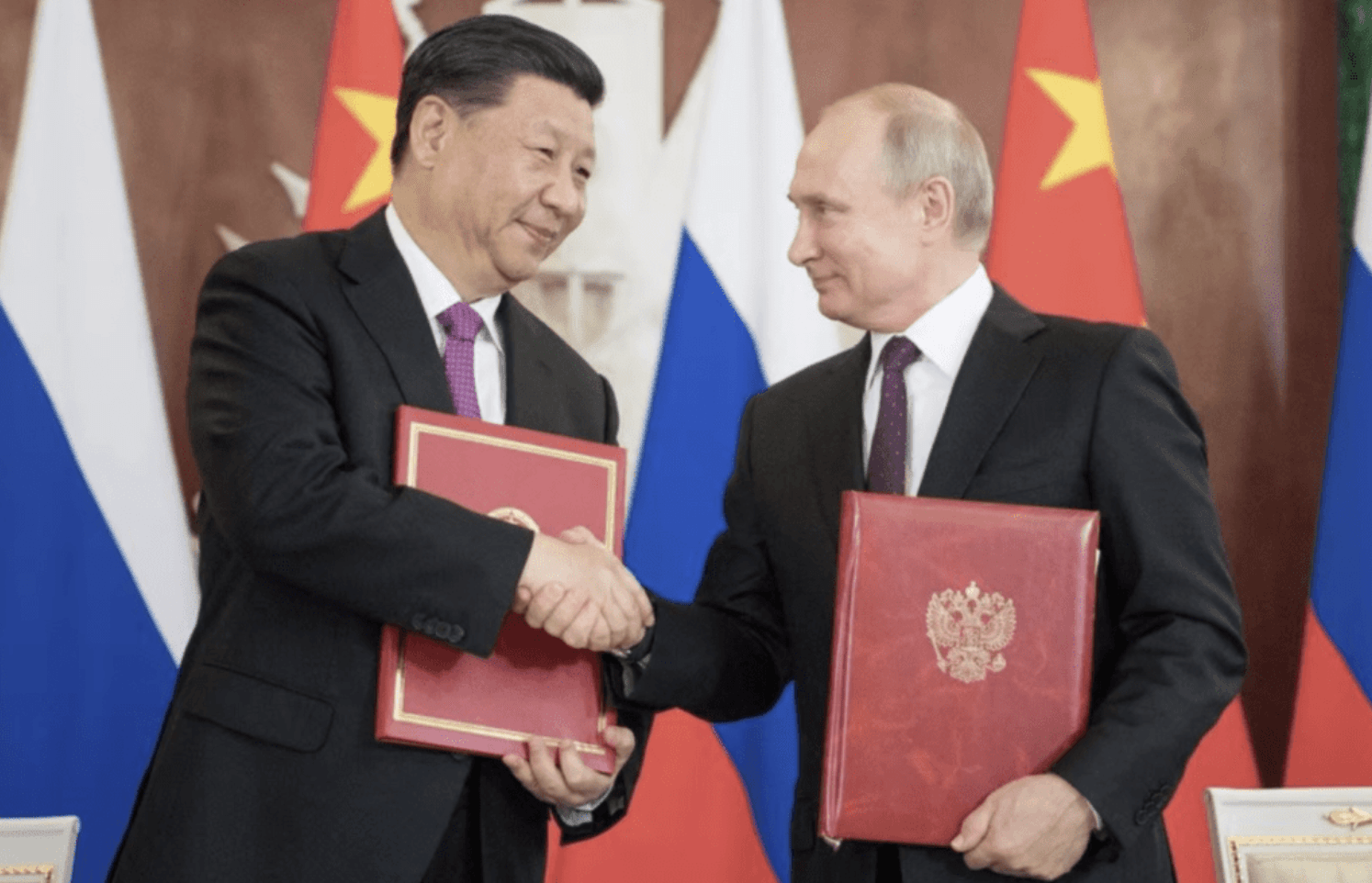Anne Applebaum’s ‘Autocracy, Inc.’: Deconstructing the War on Democracy

Autocracy, Inc.: The Dictators Who Want to Run the World
Penguin Random House/July 2024
Reviewed by Colin Robertson
August 2, 2024
It was the opening dinner of the 2018 Seoul Defence Dialogue. Sitting beside me was a People’s Liberation Army(PLA) Colonel. After a few glasses of wine – restorative after my trans-Pacific flight earlier that day – we dispensed with polite inquiries about family and weather and turned to geopolitics. “You know”, the Chinese military official told me, “what we don’t have is your alliance system, a formidable asset for the West”, and, he acknowledged, a deterrent.
Autocracies learn quickly.
Today, we face not an alliance but an axis of autocracies – China, Russia, North Korea, Iran and kindred spirits across Asia, Africa and the Americas. The Shanghai Cooperation Organisation (SCO) is seen by some as the Eurasian counter to NATO while the recently expanded BRICS is portrayed as the ‘global majority’ response to the G7. China and Russia declared their ‘no limits’ partnership in 2022. At their Washington summit this June, NATO labeled China a ‘decisive enabler’ of the Russian campaign in Ukraine. Russia also benefits from Iranian-made drones and North Korean-made armaments.
The autocracies share weapons, technologies and ‘best practices’ in surveillance, governance, propaganda, and narratives based on ‘Big Lies’. For a real-time example, look to what is happening in Venezuela.
To better understand how we got into this mess read Anne Applebaum’s briskly brilliant Autocracy, Inc. The Dictators Who Want to Run the World. Be warned, however, it’s a depressing chronicle of greed, power and Western naiveté.
Sometimes, Applebaum says, the autocrats adopt bits of ideology. Lately, Putin talks about being a Russian imperialist and the Chinese still talk about being the Chinese Communist Party and so on, but really, “when you look at what they do and how they behave, what they do has very little in common with whatever ideology they claim to have.”
The common denominator for the growing ranks of kleptocratic rulers is not ideology but rather their personal enrichment through absolute power. Applebaum writes, “The vehicles of disruption can be right-wing, left-wing, separatist or nationalist, even taking the form of medical conspiracies or moral panic. Only the purpose never changes. Autocracy, Inc. hopes to rewrite the rules of the international system itself.”
Sadly, the annual reports from Freedom House and Transparency International document the continuing decline of democracies and democratic norms.
Vladimir Putin, says Applebaum, sets the standard for autocrats: “Someone who has gathered enormous amount of wealth through money laundering, through the abuse of Western financial systems, through theft…he uses that wealth to empower himself and people around him, and then he slowly becomes more and more repressive in order to push back against any demand for transparency or the rule of law and eventually winds up as a dictator. That’s the modern path to absolute power, not through revolution or coup d’état or street battles, which might have been the case in the 20th century.”
Applebaum is scathing on how Western leaders, some through greed, but mostly through their naïve belief that globalization — open markets, trade and the internet — would inevitably lead to the universal embrace of democracy. Willi Brandt’s Ostpolitik towards the Soviet Union and the Clinton administration’s shepherding China into the World Trade Organization were both premised on the trade argument.
Convinced that new media technology would pave the road to democratization, Clinton famously declared that trying to contain the internet would be like nailing Jell-O to the wall.
“Everyone” Applebaum writes, “assumed that in a more open, interconnected world, democracy and liberal ideas would spread to the autocratic states. Nobody imagined that autocracy and illiberalism would spread to the democratic world instead.”
It’s one thing for political leadership to misread the autocrats because they assumed they were just like themselves. But what about our intelligence agencies and diplomats? Were their warnings ignored or did they get it wrong? And now that we know their game, why is the intelligence community not now responding, especially to the leaders of illiberal democracies, who want privileges without responsibilities and are autocrats in all but name?
The autocrats, writes Applebaum, denounce criticism of human rights abuses as interference in their sovereign affairs and lack of respect for “cultural and civilizational diversity and the rights of different countries to self-determination.”
China and Russia, in particular, back autocrats everywhere, “timing their own moves to create maximum chaos” all designed to “damage democracies and democratic values.” As the U.S. presidential election looms, events unfolding in both Ukraine and the Middle East alone attest to that pattern.
Applebaum, who writes for The Atlantic when she is not writing books, says she got the inspiration for Autocracy, Inc. in conversation with democracy activists in Serbia and Venezuela who described how the autocracies were increasingly working together. “Once I understood that this was happening,” says Applebaum, “then almost every place you looked at anywhere in the world, you found elements of this story”. This led to her 2021 Atlantic piece ‘The Bad Guys Are Winning’ and now Autocracy, Inc.
An historian as well as an accomplished journalist, Applebaum is married to a fellow intellectual, Radosław Sikorski, now Poland’s Foreign Minister. Applebaum’sAutocracy, Inc is a sequel to her Twilight of Democracy (2020) on the rise of authoritarianism in Eastern Europe. Applebaum’s scholarly works delve deeply into human rights in the Soviet Union and Eastern Europe. BetweenEast and West: Across the Borderlands of Europe (1994) describes the rise of nationalism in the former Soviet Union. Gulag: A History (2004) took us to Stalin’s heart of darkness winning a Pulitzer Prize. Iron Curtain (2012) details the Soviet colonization of Eastern Europe after the Second World War. Red Famine: Stalin’s War on Ukraine (2017) brought the Ukrainian Holodomor to public attention, winning the Lionel Gelber and Duff Cooper prizes.
 Autocrats Xi Jinping and Vladimir Putin in Beijing, February 4, 2022/Xinhua
Autocrats Xi Jinping and Vladimir Putin in Beijing, February 4, 2022/Xinhua
Drawing on her deep research and journalism, Applebaum concludes that the autocrats “can shift and change and often do” giving the impression that their objectives are essentially transactional. But the West should not be fooled. Autocrats are not for turning in their determination for personal enrichment, permanent power and disrupting the rules-based system.
Applebaum says we need to reframe our current approach of breaking world issues into silos. “That isn’t how autocracies see the world,” she writes. They link issues and so should we. We need to think about the struggle for freedom “not as a competition with specific authoritarian states and certainly not as war with China but as a war against autocratic behaviors,” wherever we find them, at home or abroad.
To take on the autocrats, Applebaum offers a series of suggestions. These include creating:
- Networks of lawyers and public officials cooperating with activists to combat corruption and kleptocracy.
- Financial analysts to track sanctions evasions.
- Communicators to monitor, call out and refute in real time misinformation, disinformation and propaganda.
- Military and intelligence to anticipate and halt lawless violence although as we know peace operations face considerable challenges.
To end ‘transactional kleptocracy’, Applebaum says we need to require all real estate transactions to be transparent, ban citizens from keeping money in jurisdictions that allow secrecy, and ban lawyers and accountants from dealing with them.
To succeed, says Applebaum, will require an international coalition of democratic governments, activists, media and business.
Winning the information war is especially critical to demonstrating to a jaundiced and skeptical public that democracies are the better form of government. Containing disinformation and propaganda will not be easy as we face an “epidemic of information laundering” but transparency and public exposure are the best disinfectants.
Applebaum also urges the democracies to de-couple and de-risk their dependence on autocracies for critical and strategic goods and services. She argues the Nord Stream pipelines were effectively Russian trojan horses designed to subvert Eastern European and especially German democracy. Applebaum cites Angela Merkel’s remark that Europe’s China relationship is “unbalanced and increasingly affected by distortions in China’s state capitalist system.”
Warning that democracy activists have long argued that our economic policies and research efforts are enabling the economic and military aggressions of the autocrats, Applebaum endorses US National Security Advisor Jake Sullivan’s recommendation to “build a clean-energy manufacturing ecosystem rooted in supply chains here in North America, and extending to Europe, Japan, and elsewhere.”
For Applebaum, the democracies’ ecosystem must go beyond trade to include artificial intelligence, quantum computing, the Internet of Things and all forms of surveillance. It’s a tall order but necessary if we are to halt Autocracy, Inc.
Policy Contributing Writer Colin Robertson, a former career diplomat, is a fellow and host of the Global Exchange podcast with the Canadian Global Affairs Institute in Ottawa.
